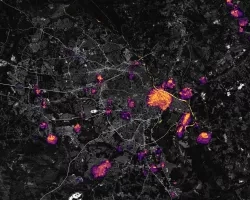NASA and the U.S. Agency for International Development (USAID) signed an agreement on Nov. 4 strengthening the collaboration between the two agencies, including efforts that advance the federal response to climate change.
This memorandum of understanding (MOU) enhances and expands the agencies’ longstanding partnership that promotes science and technology solutions to address international development challenges in areas such as global health, climate change, food security, disaster mitigation and response, biodiversity conservation, environmental management, and enable open science and data infrastructure for sustainable development.
This MOU also extends the collaboration between NASA and USAID into other NASA programs, most notably with the NASA Disasters program area. In addition to working to prepare communities by increasing resilience to future disasters, the NASA Disasters program area provides expertise and assistance before, during, and after disasters in the form of subject matter expertise, imagery, data, tools, maps, and trusted partnerships.
Prior to this latest agreement, NASA and USAID have longstanding collaborations through SERVIR and the Famine Early Warning Systems Network. SERVIR is a joint initiative aimed at co-developing innovative solutions and applications of NASA Earth science data to improve resilience and sustainable resource management at local, national, and regional scales. SERVIR is making an impact in more than 50 countries by working with and through regional technical organizations around the globe. The early warning network provides decision-makers and planners with actionable information to address food insecurity. Both collaborations have proven the value of using NASA’s latest satellite data and other information to not only impact local users’ decisions, but also help USAID evaluate the impact of their investments from a broader perspective.
More about the MOU signing can be found at the NASA.gov press release, NASA, USAID Partnership Strengthens Global Development


